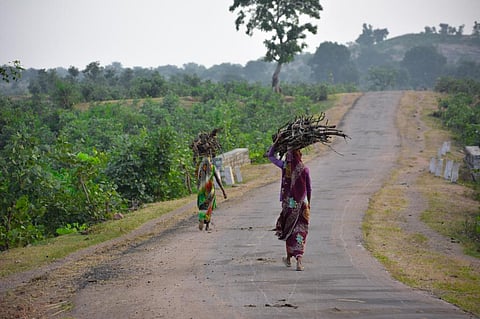

Seventeen years after the inception of The Scheduled Tribes and Other Traditional Forest Dwellers (Recognition of Forest Rights) Act, 2000, also known as FRA, a group of independent researchers have found that its implementation continues to be poor.
Implementation shortcomings highlighted a lack of political will to address the issue of forest tenure rights and justice for traditional forest dwellers and Scheduled Tribes through the FRA, the researchers found.
The study, People’s Forest: Advancing a people’s agenda for 2024 General Election, also found disregard for the connections between Adivasi and forest dwelling communities and forests. This, in addition to increasing policy inclined towards commercialisation of forests, has resulted in undermining of constitutional rights provided in the FRA, it found.
It was carried out in light of India’s upcoming general elections, with the goal of estimating the minimum potential for FRA to be identified for forest rights in parliamentary constituencies.
The researchers analysed parliamentary constituency-wise election data of the 2019 general elections recorded and published by the Election Commission of India with the FRA potential of parliamentary constituencies based on the Census of India, 2011.
The constituencies were divided into five categories, ranging from ‘Critical Value’ (where the FRA issue is most significant), followed by ‘High Value’, ‘Good Value’, ‘Medium Value’ and ‘Marginal Value’ (where FRA is the least significant issue).
It analysed 270 parliamentary constituencies with the above-mentioned importances and found 184 were unreserved, 42 were reserved for Scheduled Tribes and 44 were allotted for Scheduled Castes, where FRA is a major issue.
“The study is a reminder of our nation’s responsibilities to its most marginalised and excluded citizens and an invitation to engage in a more just and equitable India,” the researchers stated.
FRA is poorly implemented in the majority of the states due to a lack of political will and strong opposition from forest departments, the study said. At least 30 million hectares of forest land, equivalent to over 40 per cent of the total forest area, could be entrusted for Community Forest Rights (CFR) claims along with Gram Sabhas, it added.
The move could help secure rights and ensure livelihoods for at least 200 million people, including a population of about 90 million tribal people. About one-fourth of the villages in the country — approximately 1,75,000 — are eligible under the CFR, it found.
A majority of the districts with villages falling under the ambit of CFR are located in tribal areas and poverty-stricken regions, finding themselves in dispute over land and resources.
“Ground-level evidence demonstrates that rights holders have utilised the FRA, particularly its community forest rights provisions, for transforming forest management to meet local livelihood and cultural needs, ensuring food security and poverty alleviation, securing gender justice and women’s rights over land and forest, and strengthening conservation efforts to meet India’s international commitments for climate change mitigation,” the researchers wrote.
The study also analysed the performance of political parties in the 2019 general elections in parliamentary constituencies on the basis of the importance of FRA.